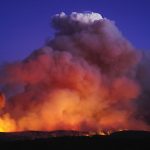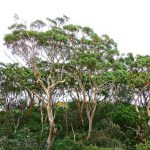 December 6, 2019 1:28 pm
Published by Climate Extremes
December 6, 2019 1:28 pm
Published by Climate Extremes
The Montreal Protocol, an international agreement signed in 1987 to stop chlorofluorocarbons (CFCs) destroying the ozone layer, now appears to be the first international treaty to successfully slow the rate of global warming.
 November 26, 2019 1:50 pm
Published by Climate Extremes
November 26, 2019 1:50 pm
Published by Climate Extremes
Catastrophic wildfires like the Black Saturday wildfires in 2009 and Canberra Wildfires of 2003, which were so large and dangerous that they generated their own weather systems – including the world’s first filmed fire tornado – are likely to be more frequent in the future as a result of climate change across southeast Australia
 November 26, 2019 10:26 am
Published by Climate Extremes
November 26, 2019 10:26 am
Published by Climate Extremes
Solar heating of surface waters in the tropical Indian and Pacific oceans, along with turbulent mixing that moves this heat into the colder deep-reaching Atlantic meridional overturning circulation, play a crucial role in shaping oceanic heat transport pathways
 November 25, 2019 12:46 pm
Published by Climate Extremes
November 25, 2019 12:46 pm
Published by Climate Extremes
This study found in CMIP5 models that are able to simulate both types of events, that convective extremes do not always coincide with warm extremes. The disassociation becomes more distinct under greenhouse warming with higher occurrences of convective extremes than warm extremes.
 November 6, 2019 11:20 am
Published by Climate Extremes
November 6, 2019 11:20 am
Published by Climate Extremes
CLEX researchers and colleagues found the Aridity Index was too simplistic to capture the many aspects that define landscape aridity, including the amount of rainfall, water resources and vegetation productivity, and is a poor indicator of future aridity changes.
November 4, 2019 2:54 pm
Published by Climate Extremes
Rita Franco-Santos (IMAS). Zooplankton performance in a changing ocean
November 4, 2019 2:52 pm
Published by Climate Extremes
Jonathan Wille (University of Grenoble, France). West Antarctic surface melt triggered by atmospheric rivers.
November 4, 2019 2:50 pm
Published by Climate Extremes
UNSW KNOWLEDGE EXCHANGE INVITE YOU TO OUR RESEARCH SHOWCASE Our panel of experts, all thought leaders in their respective areas, will explore some of the major changes needed to support a clean energy future. A selection of UNSW’s finest academics will showcase their extensive range of expertise and capability providing insight into future thinking and practice in an increasingly challenging area where swift action is required. Why attend? Connect with our experts, and discuss research capability, professional education and... View Article
 October 25, 2019 12:23 pm
Published by Climate Extremes
October 25, 2019 12:23 pm
Published by Climate Extremes
With projected increases in temperature in the future, the amount of water vapour that can be held at saturation – before it condenses into clouds, dew or water film – increases exponentially. As this deficit increases plants tend to close their stomata, which reduces water fluxes into the boundary layer. Do models currently capture the observed leaf-level response to increasing vapour pressure deficit? What about at very high levels of this deficit?
October 14, 2019 3:41 pm
Published by Climate Extremes
Workshop Scope The Bureau of Meteorology Annual R&D Workshop 2019 will provide a forum for national and international researchers, including researchers from across the Bureau, CSIRO, industry and our university partners, to communicate innovations and advances in sciences related to weather, water, ocean and climate services. Environmental forecast services range from routine daily weather forecasts for the public to seasonal outlooks and climate projections aimed at informing decisions by agriculture and water managers. Emergency managers rely on highly customised services... View Article






